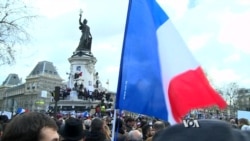Most Muslims in France were quick to distance themselves from last week’s attacks on a French satirical magazine and a kosher market. But they tend to blame the French government, saying the bloodshed is a reminder there is much to do to address the problems of the country’s disaffected minority youths.
At the Grand Mosque of Paris, midday prayers drew a small, and somewhat nervous congregation on Monday. Worshipers knew public attention was focused on France’s large Muslim community, and not in a good way.
“It is a little difficult to bear because we feel solidarity with the French and all the communities that live here in France," said a cashier named Mohamed. "There are a lot of Muslims here. It is the second largest religion in France. We lived in peace and suddenly something happened. Muslims feel a bit afraid.”
France is largely a Catholic country. The landmark Notre Dame Cathedral is guarded by a statue of Charlemagne, the 9th Century emperor who forced people he conquered to convert to Catholicism. But the French Revolution, nearly 1,000 years later, cemented a different set of values.
Liberty, equality and brotherhood were on display during Sunday’s unity march.
France’s relatively new Muslim community has become one of the biggest challenges to that concept, and the government has a lot of work to do to address the problems of poor, disaffected young men like last week’s attackers, according to Professor Susan Perry of the American University in Paris, who spoke via Skype.
“They have lived on the margins of society and there were no mechanisms to bring them in before it was too late. And so it is a government problem, but it is also a local community problem,” said Perry.
Parisians agree both the government and the Muslim community have to address the problem of Islamist militancy - particularly in neighborhoods with large, poor Muslim populations.
“The problem in France is the suburbs, they are like powder kegs. We really have to fix this problem,” said a retired secretary named Betty.
“The Muslim community has work to do in order to be better regarded by people in France and throughout the world. They can not stay like they are. They have to rectify some things,” said a retired taxicab driver named Armando.
At the mosque, though, people put most of the responsibility on the government.
“Actually, I do not think that it is only an Islamic problem," said a student named Saqina. "But maybe it is more deep, the problem is more deep, and maybe it is a social problem.”
“I think it is not only the problem of Muslims. It is everyone’s problem. In my opinion, it is a problem of politics, of economic, of global politics, in fact,” said Osman, an information systems engineer.
Osman was among a few who said French Muslims also could do more. “I think they could, in fact, work on education, really on the basics of what Islam is - that Islam truly teaches tolerance above everything.”
The attacks make that message a hard sell, but the violence also forged a cross-cultural alliance for tolerance that many hope will be stronger than the fear and mistrust that were the first reactions.





